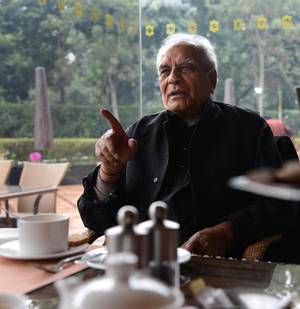Meerut, UTTAR PRADESH / NEW DELHI :

Musicians remember the genius of tabla maestro Ustad Hashmat Ali Khan
With the passing away of Ustad Hashmat Ali Khan (February 3, 1932-April 22, 2017), Indian classical music has lost not only a great tabla maestro but also a generous teacher. In a world where people are stingy about passing trade secrets, the Khalifa (head) of the Ajrara gharana of tabla used to say, knowledge grows by sharing. In the words of Pandit Suresh Talwalkar, “Ustad Hashmat Ali Khan was a wonderfully warm man, with a great sense of humour and extremely polished courtly manners of a bygone age, and most of all, the finest teacher one could have.”
A 7th generation musician, the Ustad belonged to the family that despite playing a type of tabla so close to the original Delhi gharana of tabla, was able to maintain its distinct “baaj”.Born in Meerut, his grandfather Ustad Mohammed Shafi Khan was one of the navaratnas of the Maharaja of Baroda. When he was about eight, his grandfather took him to Baroda, and that is where he received his taleem. Once India gained independence, the princely states dissolved, the young Hashmat returned to Meerut where his father put him under the tutelage of Ustad Niazu Khan.At a very young age, he started teaching at New Delhi’s Bhartiya Kala Kendra. Part of the greatness of the maestro was his extremely intellectually open mind – he was always analysing the music style of others and was quick to praise. He incorporated many pleasing elements from other styles in his playing, but with a seamlessness that was envied by his fellow musicians. Talwalkar says, “He was able to embellish his playing very well; even though his own gharana Ajrara was so beautiful, yet he was able to add to it. He was also a very good human being, and extremely learned.”
Pandit Kumar Bose evinces his sorrow at the death of the Ustad, whom he describes as “bahut guni, and iss umar mein bhi, itne tayyar… He was a very fun loving and good natured man.” He added, as a tabla exponent he had researched and added to his gharana’s baaj with great finesse, and he hoped “that his son Akram keeps his music alive.”
Cosmopolitan outlook
Khan was also a very well travelled and cosmopolitan man; he had lived abroad in many countries including Russia, Mauritius, Guyana, Fiji and Australia for years, where he had been sent by the ICCR to teach. He has several students there. His wide travels had given him an urbanity not found in many musicians of his generation. One can recall anecdotes he would relate about an older generation of musicians. With an appropriate pause before the punchline, the subtle embellishments to the main story – Khan sahib was indeed extremely entertaining. There was always a compassion even while talking about musical frailties in others.
Indeed, this much loved musician will be missed; yet the legacy he leaves behind with his numerous disciples, including his musical inheritor, Ustad Akram Khan, and his grandsons, will remain.
source: http://www.thehindu.com / The Hindu / Home> Entertainment> Music / by Shailaja Khanna / April 24th, 2017








